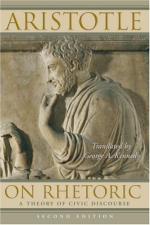
|
| Name: _________________________ | Period: ___________________ |
This quiz consists of 5 multiple choice and 5 short answer questions through Book III, Chapter 10-12.
Multiple Choice Questions
1. How many non-technical means of persuasion did Aristotle discuss in Book I, Chapter 15?
(a) Two.
(b) Five.
(c) Three.
(d) Four.
2. How many forms did Aristotle think the emotional appeal could take?
(a) One form.
(b) A variety of forms.
(c) Two forms.
(d) Only a few specific forms.
3. Which characteristic did Aristotle think separated powerful people and wealthy people in general?
(a) Virtue.
(b) Knowledge.
(c) Reliability.
(d) Consistency.
4. What did Aristotle say was the chief concern of political rhetoric?
(a) What is feasable.
(b) What is arguable.
(c) What is useful.
(d) What is obvious.
5. Why did Aristotle think the universal law was higher than the special law?
(a) It changes for the better.
(b) It never changes.
(c) It always changes.
(d) It rarely changes.
Short Answer Questions
1. According to Aristotle, how was the structure of text conveyed in the periodic prose?
2. Which one of the following would be an example of a fallacious enthymeme?
3. What did Aristotle think anger was always directed towards?
4. Which of the following did Aristotle think were more likely to commit crimes?
5. Which one of the following assessments did Aristotle use to support his analysis in Book I, Chapter 7?
|
This section contains 312 words (approx. 2 pages at 300 words per page) |

|




